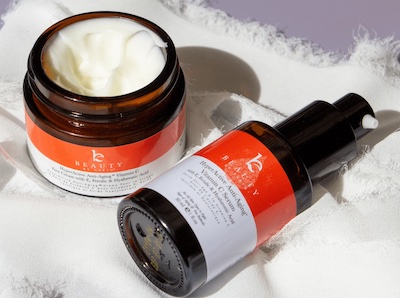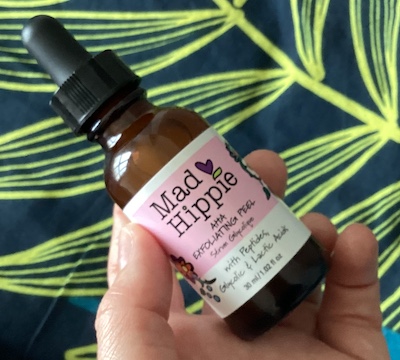
Article By Edna Skopljak – Medical Doctor (MD)
Motherhood can sometimes be so overwhelming, with the rollercoaster of all kinds of emotions, and also physical changes. Among others, there are a lot of hormonal changes, that can have obvious effects on your body – and skin.
During and after pregnancy, you may be dealing with one of the most annoying skin concerns – acne. And you may want to try retinol, as an effective solution to this issue.
Furthermore, it is beneficial for other skin concerns, so topical retinol may seem like a miracle solution. You may also want to improve skin elasticity during postpartum, which is something that retinol usually helps you with too.
But, can you use retinol while breastfeeding? Is it really safe to use retinol while breastfeeding? Can it hurt your little one?
Topical retinol does pass through your skin and goes into your bloodstream. Did you know it’s one of those skin care ingredients that increase risk for birth defects?!
If you are considering retinol products, this article will help you decide whether it is a safe option for you and your breastfeeding baby. I’ll also share my favorite retinol alternatives that are breastfeeding-safe – so keep on reading!
This article is not a substitute for medical advice or consultation.
What Is Retinol & What Are Its Benefits
Retinol is part of a group of chemicals called retinoids. Retinoids are thought to be effective in reducing acne, fine lines, and wrinkles. In fact, that is a synthetic form of vitamin A1.
Its greatest benefit is fighting acne. Retinol unclogs pores, making it an effective treatment for acne. Furthermore, it may reduce the appearance of existing acne scars by its ability to increase skin cell turnover.
It promotes collagen production and blood flow. That makes it also a great treatment (applied topically) for aging skin, but topical retinoids are primarily prescribed for treating acne. It removes dead skin cells and clears your skin cells like a miracle, while improving your skin texture and skin tone.
However, with all the good sides in treating skin concerns, retinol does have some negative effects. It may give you irritated skin – especially if you have sensitive skin already.
Another concern with regard to retinol is – the chemicals from retinol are being absorbed into your bloodstream, which may – in turn – be passed to your baby while you’re pregnant, and to your breast milk when you are a breastfeeding mother.
Can I Use Retinol During Pregnancy?
You have to be extra careful during pregnancy and breastfeeding. Any substance you use, in any form, may be absorbed into your bloodstream and potentially cause some side effects.
This means you have to be cautious with skincare ingredients. It is sometimes difficult to change your skincare routine, but it is for your baby’s health. Keep that in mind, always.
The use of retinol during pregnancy is potentially dangerous, as it is a quite powerful substance. According to FDA classification, retinoids are considered a category C drug2. That means that retinoids have shown some risk to animal fetuses, although there hasn’t been extensive human testing.
Retinol is weaker than other prescription retinoids, but it is not actually tested how much retinol does pass to your little one. And, I am sure that you don’t want to risk.
There is some evidence that prescribed retinoids, especially oral retinoids, may cause birth defects and fetal retinoid syndrome3.
The fetal retinoid syndrome may cause physical and mental developmental issues in a baby. And – although retinol is weaker than the prescribed retinoic acid, it is still better to be safe than sorry, right?

Is It Safe To Use Retinol While Breastfeeding?
The same story as with pregnancy – topical retinol while breastfeeding passes into your bloodstream – and eventually into your breast milk.
So, should you continue (or start) using retinol while breastfeeding? Actually, there is not enough scientific data to reveal the exact dangers or safety of using retinol while breastfeeding4. But, the existing data are not so positive – but they are unclear. So using retinol while breastfeeding would be risky.
Although the minimal use of topical over-the-counter retinol could (potentially) be well-tolerated if your baby doesn’t come in direct contact with the skin, it is not clear how much of it comes into your breast milk while breastfeeding. And, although the risk isn’t very high – there is still some risk that it may hurt your baby.
So, the answer is simple: breastfeeding women should avoid retinol. Retinol is an acne and age-fighting skincare ingredient that you shouldn’t use while breastfeeding. There are safe, effective alternatives, so you can still have healthy, smooth skin.
Another, but important aspect to consider, when you are breastfeeding, your hormones are all over the place. That means that your skin may also be more sensitive than usual.
That is why you need to choose skincare products that won’t irritate your skin or cause breakouts. Retinol serums may cause irritation. And you don’t want it during pregnancy, believe me.
Does Retinol Pass Through Breast Milk?
Almost any medication, drug – even topical, that’s present in the bloodstream will transfer into breast milk to some extent. Some drugs become present in breast milk at low levels, while some can, unfortunately, be found at high levels.
When it comes to topical retinol product, the amount passed to your child through breast milk is unknown. Since retinol products have been linked to congenital disabilities in babies when used during pregnancy, it is suggested that you avoid using them during both – pregnancy and breastfeeding.
But, because any risk of passing retinol to your baby will go away when you stop breastfeeding, you can incorporate retinol back into your daily skincare routine as soon as you are done with breastfeeding.
What Is A Good Retinol Substitute For Breastfeeding?
If you are disappointed by the fact that you shouldn’t use retinol skincare products, stay calm. There are breastfeeding-safe alternatives to retinol. And these include hyaluronic acid, lactic acid, azelaic acid, salicylic acid, and glycolic acid.
These skincare products are all considered safe to use during pregnancy and breastfeeding and have similar effects as retinol. Let’s see how they work:
1. Bakuchiol
Bakuchiol is probably the best breastfeeding-safe alternative for retinol. This antioxidant has completely different chemical composition. It also helps to reduce the visibility of wrinkles and fine lines – just like retinol, but doesn’t lead to adverse side effects. Moreover, bakuchiol is plant-based, in contrast to retinol which is synthetic form of vitamin A. and
According to experts, bakuchiol is safe for breastfeeding women (and safe during pregnancy)5.
2. Vitamin C
Vitamin C, in particular, is a good substitute for retinol while breastfeeding6. Vitamin C is considered safe to use during pregnancy and has some of the same collagen-boosting, hyperpigmentation-fading benefits as retinol does. So, it may also help you with dark spots.
In fact, vitamin C plays a very important role in the production of collagen, providing skin elasticity, also provided by retinol.
Furthermore, as vitamin C is also an antioxidant, it protects cells from damage by fighting free radicals. So, it protects your skin from sun damage and prevents signs of aging.
3. Hyaluronic Acid
Although hyaluronic acid, has “acid” in its name, it doesn’t work like other acids – it’s gentle on the skin and doesn’t exfoliate it. Remember that hyaluronic acid is breastfeeding-safe.
Hyaluronic acid can help you reduce wrinkles and hydrate your skin. As it is a natural substance, regularly found in our skin, it is safe to use during expecting months and while breastfeeding.
Hyaluronic acid keeps our skin plump, hydrated, and youthful-looking while being gentle on our skin. And ‘gentle’ is exactly what we are looking for as expecting and nursing mothers.

4. Lactic Acid
Lactic acid is the most gentle alpha-hydroxy acids that exfoliates your skin by breaking down the bonds between dead skin cells. It is a great alternative to retinol while breastfeeding (or pregnant), as it may help you with acne and it also shows some anti-aging benefits.
It unclogs pores – preventing acne, and attracts moisture to the skin. This, in turn, helps your skin fight acne by speeding up the cell turnover and providing you with new, healthy skin.
5. Glycolic Acid
This retinol alternative helps keep your skin clear, as it removes excess oil and exfoliates dead skin layers. But that’s not all: it creates microscopic wounds in the skin that generate collagen production.
So, it shares some properties with retinol, but the difference is that glycolic acid is safe to use during the most sensitive times like breastfeeding.
However, it shares another thing with retinol: it increases sun sensitivity. Therefore, make sure you use sunscreen.
Apart from glycolic acid, there is one more AHA that is safe during breastfeeding: lactic acid. In many body scrubs and peels these two acids are actually combined. This is a powerful mixture for clearing up acne during the time when you cannot use retinol for your blemishes.

6. Azelaic Acid
This is another acne treatment, among the best retinol alternatives7, that contains anti-inflammatory and antimicrobial properties. It is a natural alternative – azelaic acid is derived from a type of yeast present on healthy skin.
So, if you have acne-prone skin, and you are looking for retinol alternatives during breastfeeding and pregnancy, azelaic acid is a great option.
| PRO TIP: Although these skincare products are safe during breastfeeding, don’t apply them to the breast or any other part of your body that your baby can come in a direct contact with or lick. |
Other Skincare Ingredients That You Should Avoid When Breastfeeding
Now that you know that skincare products may also have some harmful effects on your little one, you may wonder: are there any other skincare ingredients to avoid while breastfeeding?
And the answer is… Yes! There are some skincare ingredients that breastfeeding women should avoid on their wonderful and beautiful, but sometimes overwhelming breastfeeding journey.
Skincare beauty products containing hydroquinone, an over-the-counter product for skin bleaching, present a potential hazard during the expecting and nursing months, so they should be avoided during this time8.
Furthermore, minoxidil, a medication used to treat hair loss or hair thinning, should not be used during breastfeeding and pregnancy as it can negatively impact the baby.
Also, breastfeeding mothers should be careful with using spray tans, because although the spray tanning chemicals are not passed to the breast milk, they may be picked up by your baby through skin-to-skin contact with you.
Another skincare product to be avoided during these times is – Botox. There is not enough scientific research available on its possible side effects and certain risks during breastfeeding – and it is best to avoid it.
Similarly, there are animal research results suggesting that oxybenzone may cause changes to mammary glands. So, it is recommended that new mums avoid some sunscreens containing this particular substance in their postpartum period.
I know that you love your retinol cream. And that it helps your skin with severe acne or premature aging. But, as mothers, we make sacrifices all the time. We get our strength from the love and affection our babies show us. Their smile is worth it, right?
So, for your baby’s sake, you can change your skincare routine for this short period, and start using retinol when you finish breastfeeding. If you are still unsure which alternative to choose, talk to your dermatologist (in fact, visiting your dermatologist is recommended anyway!).
Article By Edna Skopljak
Edna Skopljak is Medical Doctor (MD) who works in University Medical Centre in Ljubljana. She’s a She also worked as an editor at BJBMS medical journal for several years. She wrote content for several health-related websites and the BJBMS blog. She’s a mom of a 15-month-old.
The purpose of this article is informative. It’s not a substitute for professional medical advice or medical care. Remember: safety first! Consult your doctor/pediatrician in case of any doubts. The author of this article does not accept any responsibility for any liability, loss or risk, personal or otherwise, incurred as a consequence, directly or indirectly, from any information or advice contained here.
Resources:
https://www.ncbi.nlm.nih.gov
https://www.verywellfamily.com/
https://kinfertility.com.au/
https://milk-drunk.com/
https://procoal.co.uk/
https://www.healthline.com/
https://healthnews.com/
Picture of the cream and toner belongs to Beauty By Earth. Source: https://beautybyearth.com/

